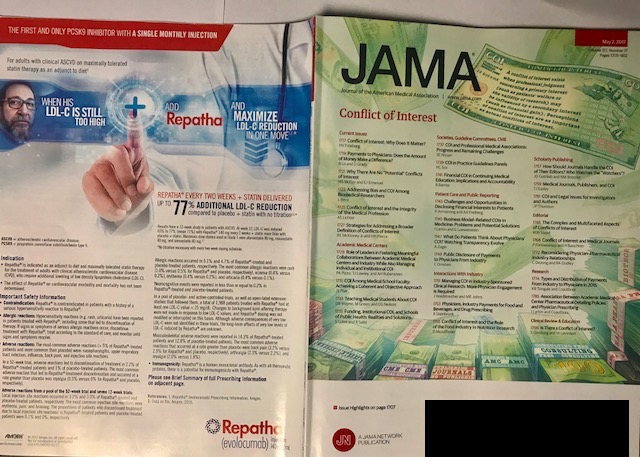Then the bill moved to the much larger Texas House and got noticed. Like the Alamo, the bill was quickly recognized as a threat to the multi-billion dollar-a-year health care academic, quality, and safety industries. The American Hospital Association (AHA) and ABMS and American Board of Surgery (ABS) lobbies descended on the halls of unsuspecting Texas Representatives with whom they've had long-standing relationships. The legislators were caught between appeasing physicians and appeasing the largest employers in the state of Texas. Dazed and confused about what "MOC" even was, the representatives caved to the inclusion of special clauses that left loopholes for the rich and powerful organizations to re-gain control. The bill's sponsor and anti-MOC physicians who met with as many representatives as they could, fought valiantly to stem the oncoming legislative changes that weakened the bill but were outnumbered. The bill advanced to the Calendar Committee to schedule a date for a vote at the end of the crammed legislative session. The bill could have died in Committee and not gotten a date for the vote, but the word had spread. The Committee received so many calls and emails from physicians across the country they had to close their office to calls. Even the bill's sponsor pleaded to hold off on further calls. Remarkably, the bill went to the floor for a vote. Before the vote, five "points of order" arose, forcing the bill back into committee. There, more changes were made, and eventually exceptions granted to the richest, most powerful institutions in Texas on the basis that MOC was important to assure physician quality and its "practicing improvement projects" were legitimately valuable exercises to improve patient care. Only the last wall of the Alamo, the inability to use MOC for state licensure, remained as a testament to the battle.
The final wording of the bill moved on to the governor's desk for signature, cementing the MOC program as a required educational program for physicians in many of the states' largest hospital centers.
With all this happening in Texas, it was hard not to "remember the Alamo."
The final wording of the bill moved on to the governor's desk for signature, cementing the MOC program as a required educational program for physicians in many of the states' largest hospital centers.
With all this happening in Texas, it was hard not to "remember the Alamo."
But while this legislative Alamo battle may have been lost in some ways, it was won in others. Practicing physicians learned a lot from this battle, no doubt patients did too. We learned firsthand who really feels MOC should succeed. We heard our fellow physicians who defended MOC on Twitter conflate initial certification with MOC, as they often do. We were struck when members of the American Board of Surgery (ABS) rallied to MOC's defense on Twitter, even as the ABS fails to disclose how much of their relatively small $8M/year revenue they earn from MOC on their tax forms. When the legislative battle ended and the dust settled, we saw those same outspoken critics to the anti-MOC movement gleefully proclaim on Twitter that Senate Bill 1148 "excludes those world class med centers....doesn't apply to #Medschools #cancer centers #trauma centers. #NICU docs...." as if more discrimination was a good thing. No doubt the far more numerous family practice physicians, pediatricians, and internists in Texas who don't have full time nurse practitioners, residents, fellows, political sway, and NIH grants at their disposal think differently.
It remains to be seen if the Texas SB 1148 will really have an impact for practicing physicians increasingly forced to comply with MOC as doctors point to the legislation in the Medical Executive Committees and can't change their bylaws because of the loopholes for some, but not all.
As patients and physicians learn of the realities of the ABMS MOC program and are caught in its regulatory grip, they are flocking to the anti-MOC effort, not running from it. Physicians understand that those that support MOC support corruption, political cronyism, and even tax fraud. To that end, we understand MOC is not about patient quality, but instead about money. The AHA and the ABMS know this, but have to support each other as member organizations of the Accreditation Council for Graduate Medical Education. While losing MOC would mean little to the AHA, the program is critical for the ABMS's survival due to their long-standing overspending, political agendas, and pension programs.
Texas has taught us that the physician anti-MOC movement is unstoppable. It is coming, whether the insurance companies or hospital lobbies like it or not. It is just a matter of time before we educate every legislator in every state, the IRS, and the Federal Trade Commission about what MOC was and what it has become.
But unknowns remain. We want to know what the ABMS International agenda that we pay for really is, we want to know why we fund real estate companies like ABFM Realty, LLC that no-one mentions, we want to know why the leadership of these independent non-profit agencies have to make such exorbitant salaries and benefits, and we want to know why contracts to Premier, Inc, and PearsonVue and hundreds of other contractors are more important to satisfy than time with our patients. Our patients have the right to know. It is time to stop the cover-up.
We are on the right side of this and we know it, whether Texas Senate Bill 1148 matters or not.
We will never forget and neither will our patients.
-Wes
It remains to be seen if the Texas SB 1148 will really have an impact for practicing physicians increasingly forced to comply with MOC as doctors point to the legislation in the Medical Executive Committees and can't change their bylaws because of the loopholes for some, but not all.
As patients and physicians learn of the realities of the ABMS MOC program and are caught in its regulatory grip, they are flocking to the anti-MOC effort, not running from it. Physicians understand that those that support MOC support corruption, political cronyism, and even tax fraud. To that end, we understand MOC is not about patient quality, but instead about money. The AHA and the ABMS know this, but have to support each other as member organizations of the Accreditation Council for Graduate Medical Education. While losing MOC would mean little to the AHA, the program is critical for the ABMS's survival due to their long-standing overspending, political agendas, and pension programs.
Texas has taught us that the physician anti-MOC movement is unstoppable. It is coming, whether the insurance companies or hospital lobbies like it or not. It is just a matter of time before we educate every legislator in every state, the IRS, and the Federal Trade Commission about what MOC was and what it has become.
But unknowns remain. We want to know what the ABMS International agenda that we pay for really is, we want to know why we fund real estate companies like ABFM Realty, LLC that no-one mentions, we want to know why the leadership of these independent non-profit agencies have to make such exorbitant salaries and benefits, and we want to know why contracts to Premier, Inc, and PearsonVue and hundreds of other contractors are more important to satisfy than time with our patients. Our patients have the right to know. It is time to stop the cover-up.
We are on the right side of this and we know it, whether Texas Senate Bill 1148 matters or not.
We will never forget and neither will our patients.
-Wes


